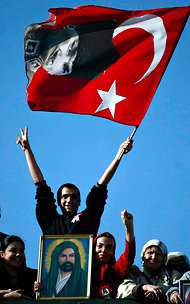By ANDREW FINKEL
ISTANBUL — It is the holy month of Ramadan and, just before twilight, my Istanbul neighborhood fills with an intoxicating smell from the two wood-fire oven bakeries feverishly producing loaf after crusty loaf of seasonal bread. There’s a bustle of last-minute shopping and of people rushing to get home. When the sun finally goes down and the call to prayer comes, the streets are eerily silent except for the clink of cutlery from open apartment windows as families sit down to break the fast.

It’s a ritual I enjoy to watch; it’s not one in which I share. I don’t fast, but, of course many of my Muslim neighbors don’t either. One or two of the nearby restaurants shut for the month, and the local meyhane taverns, where people go to eat and drink raki, take the month off. But most places stay open and the passersby who fast don’t seem bothered by the regulars at the sidewalk eateries having lunch.
Ramadan is so attractive, in part, because Turkey wears its faith lightly. People are generally tolerant of those who don’t share their beliefs, making those beliefs seem all the more sincere. But Ramadan does occasionally produce tensions, especially in the conservative parts of the country.
Every Ramadan, news reports circulate of neighborhoods less gentrified than my own where people are bullied for not observing the fast. This is taken by many people as evidence of creeping pressure from the conservative government challenging the secular way of life. But that argument can be flipped around: Pious Turks could make a strong case that they are the ones under pressure to conform. Women, for example, still cannot wear headscarves while working in many professions.
Still, there are times when stories of conservative pressures grab our attention much like the predawn drumming that rouses people to a meal during Ramadan. Traditionally, a drummer patrols the streets in the last minutes of the night, waking people for an early breakfast so they can have food in their system just as the fast begins at sunrise. Even my neighbors who fast have always objected to the custom — the racket invariably would come too early.
Last week, a family living in a village near Malatya in the east of Turkey objected vigorously to the Ramadan drummer thumping outside their door. The argument turned into a brawl and, later in the day, into a riot.
A group estimated to be between 300-500 people gathered outside the sleepers’ home, pelting the house with stones and burning down a barn.
“I’m not acting in my own name,” the drummer Mustafa Evsi told Radikal newspaper. “I’m doing it for Islam.’’ He demanded that the family “get out of town.”
The family in question belongs to the Alevi branch of Islam, a form of Shiism mixed with Turkish folk elements complicated by many variations — making it difficult for an outsider to define. Many adherents ignore the Ramadan fast and, unlike their Orthodox cousins, are less strict about consuming alcohol or even going on the Hajj.
Alevis make up anywhere between 15-to-25 percent of Turkey’s population and yet their rights are systematically ignored. The huge state-funded religious establishment, which pays clerics’ salaries, does not finance Alevi religious leaders’ pay. Alevi places of worship are given a lesser legal status as cultural centers. Compulsory religious education in schools ignores Alevi beliefs altogether and teaches only the Sunni mainstream.
This institutional intolerance is the product of Turkey’s peculiar form of secularism, which has been less about separating mosque from state than keeping religion squarely under an official thumb. Turkey’s Alevis are just too unorthodox to keep pinned down. And where there are large Aelvi communities next to Sunni populations, trouble can break out.
The last serious outburst of violence was in 1993 when a mob set fire to a hotel in Sivas where an Alevi celebration was taking place. Thirty-seven people died.
Andrew Finkel
Previous Posts
Turkey’s Energizing Opposition
Destroying Istanbul
Lest We Remember
What happened last week in Malatya was a comparatively minor incident. But the government has been slow to react. Indeed, the prime minister made matters worse by referring in a television interview Sunday night to a particular Alevi place of worship not far from where I live as “an eyesore.”
“Secularism means respecting people’s differences,” my electrician told me when he came to fix the lights. He is an Alevi, also from a village in Malatya, and no stranger to discrimination. “But how do you expect uneducated people to respect us when the government doesn’t?”
The current government was elected with a mandate to end discrimination against religion in public life, not to discriminate against those Turks whose faith is different from the mainstream. If they need lessons in tolerance, they should visit my neighborhood.
Andrew Finkel has been a foreign correspondent in Istanbul for over 20 years, as well as a columnist for Turkish-language newspapers. He is the author of the book “Turkey: What Everyone Needs to Know.”
via Tensions in Turkey During Ramadan – NYTimes.com.

Leave a Reply